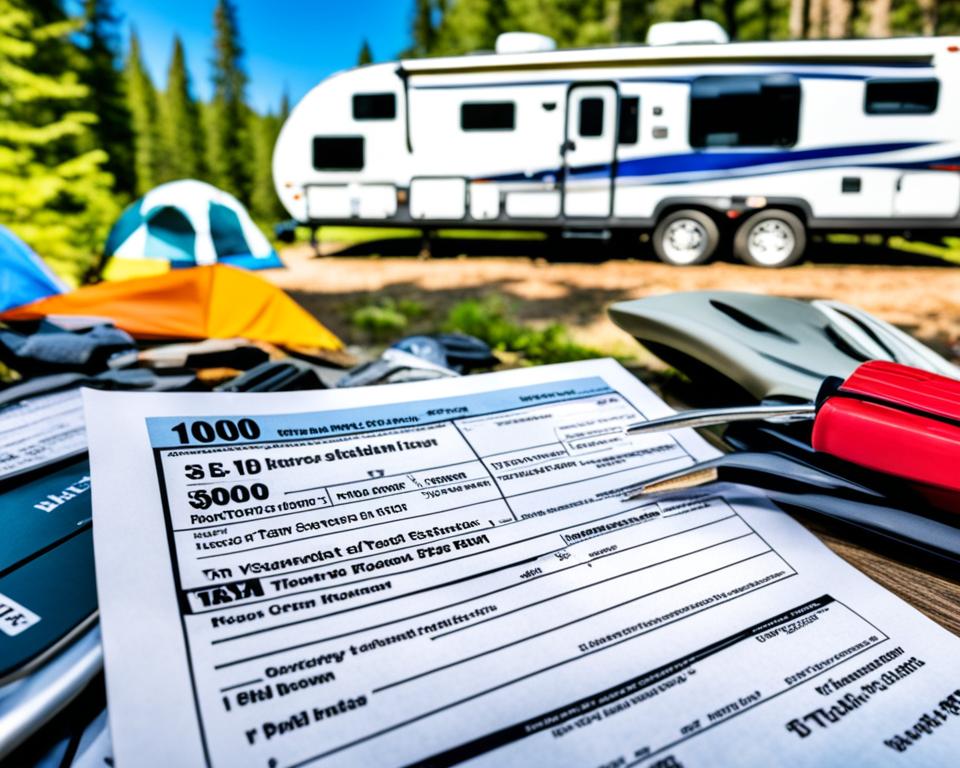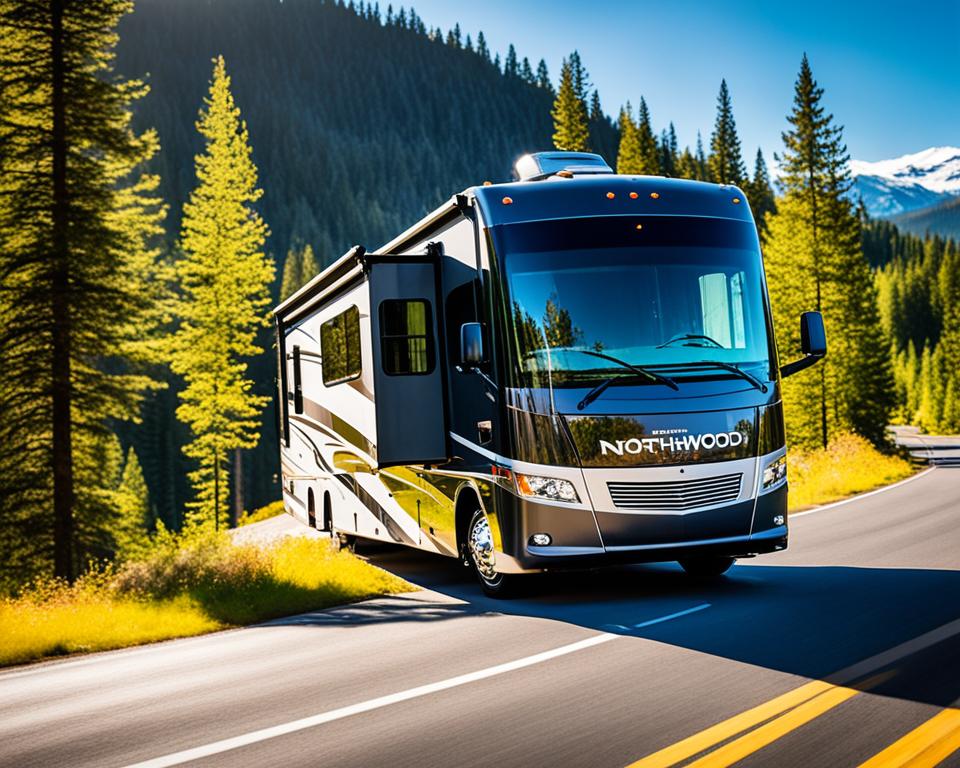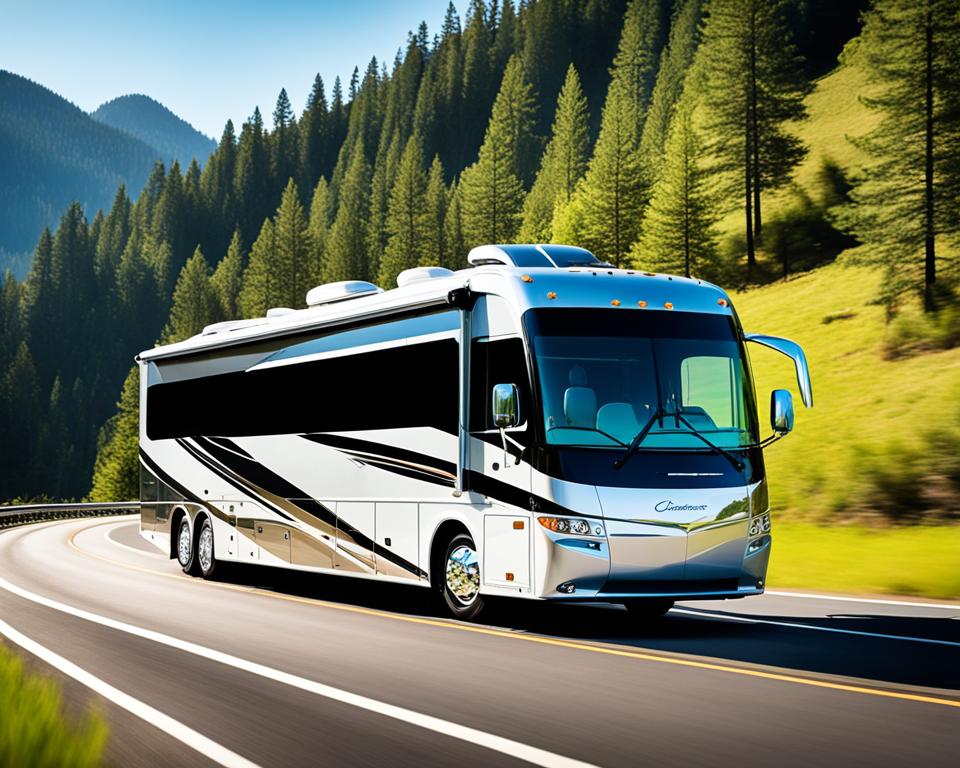Are recreational vehicles tax deductible? If you own an RV, you may be wondering about the various tax deductions available to you. Understanding the IRS rules and regulations surrounding RV tax deductions is essential for maximizing your savings and minimizing your tax liability.
When it comes to tax deductions for RV owners, there are several options to consider. From deducting expenses related to the purchase and maintenance of your recreational vehicle to claiming deductions for using it as a home office or for business travel, understanding these deductions can provide significant benefits.
Key Takeaways:
- RV owners may be eligible for various tax deductions related to their recreational vehicles.
- Understanding the IRS rules and regulations is crucial for claiming these deductions correctly.
- Deductions can include sales tax, property tax, loan/mortgage interest, business expenses, and more.
- Consulting a tax professional is recommended to ensure eligibility and maximize deductions.
- It’s important to stay updated on tax law changes as deductions may vary from year to year.
Types of RV Tax Deductions
RV owners can take advantage of various tax deductions to reduce their overall tax liability. These deductions can help offset the costs associated with owning and maintaining an RV. Understanding the different types of RV tax deductions is essential for maximizing your tax benefits. Here are the main deductions available to RV owners:
Sales Tax Deduction
When purchasing an RV, you may be eligible to deduct the sales tax paid on the purchase. However, it’s important to note that this deduction is only available in states that impose sales tax on RV purchases. Keep records of the sales tax paid to claim this deduction effectively.
Property Tax Deduction
If you reside in a state that charges property tax on vehicles, you may qualify for a property tax deduction for your RV. The deduction amount is usually a percentage of the RV’s value and can sometimes be combined with the sales tax deduction. Be sure to check your state’s regulations and keep records of your property tax payments.
Loan/Mortgage Interest Deduction
If you have a loan or mortgage on your RV, you may be eligible for a deduction on the interest paid. To qualify, your RV must meet certain criteria as defined by the IRS, such as having sleeping, cooking, and toilet facilities. Ensure you finance your RV with a secured loan and keep track of your interest payments.
Business Deductions
If you use your RV for business purposes, such as renting it out or using it as a mobile office, you may qualify for various business deductions. These deductions can include expenses for maintenance, repairs, insurance, and even mileage. Keep meticulous records of your business-related expenses to support your deduction claims.
RV Used as a Home Office
If you use your RV as a dedicated home office, you may be eligible for a deduction related to the portion of the RV used for business purposes. To claim this deduction, the RV must meet specific criteria and be used exclusively and regularly for your business. Keep detailed records and documentation to support your home office deduction.
| Deduction | Description |
|---|---|
| Sales Tax Deduction | Deduct sales tax paid on RV purchase |
| Property Tax Deduction | Deduct property tax paid on RV |
| Loan/Mortgage Interest Deduction | Deduct interest paid on RV loan or mortgage |
| Business Deductions | Deduct expenses related to using RV for business |
| RV Used as a Home Office | Deduct portion of RV used as a dedicated home office |
By taking advantage of these tax deductions, RV owners can significantly reduce their tax burden and make owning an RV more financially beneficial. Be sure to consult with a tax professional to ensure you meet all the requirements and fully maximize your tax benefits.
Sales Tax Deduction
The sales tax deduction is a valuable benefit for RV owners, allowing them to deduct the sales tax paid on their RV purchase. This deduction helps reduce the overall cost of ownership and provides financial relief. However, it’s important to understand the eligibility criteria and limitations associated with this deduction.
Eligibility for the sales tax deduction for an RV purchase depends on the state where the RV was bought. Not all states charge sales tax on RVs, so it’s crucial to check the specific rules and regulations of the state of purchase. If the RV was purchased in a state that imposes sales tax, the owner may be eligible for the deduction.
It’s important to note that there may be limitations on the amount that can be deducted for the sales tax. The IRS sets a maximum limit for sales tax deductions, and it’s necessary to ensure that the deduction claimed does not exceed this limit. Consulting a tax professional can provide guidance on the specific limitations and help ensure compliance with IRS regulations.
Here are some key points to remember about the sales tax deduction for RV purchase:
- Eligibility for the deduction depends on the state where the RV was purchased.
- Not all states charge sales tax on RVs.
- There may be limitations on the amount that can be deducted.
- Consulting a tax professional can help navigate the complexities of the sales tax deduction.
The sales tax deduction is a valuable opportunity for RV owners to save money on their RV purchase. By understanding the eligibility requirements and limitations, RV owners can take full advantage of this deduction and enjoy the financial benefits it offers.
Property Tax Deduction
RV owners who live in states that charge property tax for vehicles may be eligible for a property tax deduction. The deduction allows RV owners to reduce their taxable income by deducting a percentage of the RV’s value. This deduction can provide significant savings for RV owners, especially for those who own higher-value RVs.
The property tax deduction for RVs may be combined with the sales tax deduction, providing an even greater tax benefit. By combining these deductions, RV owners can maximize their tax savings and reduce their overall tax liability.
It’s important to note that the eligibility for the property tax deduction may vary depending on the state where the RV is registered. Some states may have specific criteria or limitations for claiming this deduction, so it’s essential to consult with a tax professional or review the IRS guidelines for your specific state.
| State | Property Tax Deduction |
|---|---|
| California | $100,000 or 70% of the RV’s value, whichever is lower |
| Texas | 2.5% of the RV’s value |
| Oregon | Weight-based calculation |
| Florida | Depends on the county |
| Arizona | Varies based on the RV’s assessed value |
As shown in the table above, the property tax deduction can vary significantly by state. It’s crucial to research and understand the specific requirements and limitations in your state to ensure eligibility and maximize your tax savings.
Remember to keep detailed records of your property tax payments and consult with a tax professional to determine your eligibility and accurately claim the property tax deduction.
Loan/Mortgage Interest Deduction
RV owners who have taken out a loan or mortgage to finance their RV purchase may be eligible for a valuable deduction on the interest paid. This deduction can provide significant savings and make owning an RV more affordable. However, there are certain requirements that must be met to qualify for this deduction.
In order for an RV to qualify as a home for tax purposes, it must have certain essential facilities, including sleeping, cooking, and toilet facilities. This means that a basic camping vehicle may not meet the criteria for the loan/mortgage interest deduction. It’s important to ensure that your RV meets these requirements before claiming the deduction.
If you have obtained a secured loan or mortgage to finance your RV, you can claim the loan/mortgage interest deduction on IRS Form 1098. This form is typically provided by the lender and reports the amount of interest paid throughout the tax year. Be sure to consult the instructions for Form 1098 and follow the guidelines provided by the IRS to accurately report your deduction.
When considering financing options for your RV purchase, it’s essential to explore different lenders and compare interest rates and loan terms. Taking the time to research and find the best financing option can not only help you secure a favorable loan but also maximize your potential deductions. Remember, the loan/mortgage interest deduction can provide significant tax savings, so it’s worth exploring all available options.

Summary:
RV owners who finance their purchase through a loan or mortgage may be eligible for a deduction on the interest paid. To qualify, the RV must meet certain requirements, including having sleeping, cooking, and toilet facilities. IRS Form 1098 is used to report the interest paid, so be sure to consult the form’s instructions and accurately report your deduction. Exploring different financing options can help secure a favorable loan and maximize potential deductions.
Business Deductions
RV owners who use their RV for business purposes may be eligible for various business deductions. These deductions can apply to RVs used solely for business, RVs used for full-time living and work, and RVs used for mixed personal and business use. Keeping detailed records of business-related expenses is important to qualify for these deductions.
When an RV is used solely for business purposes, owners can deduct expenses related to its operation and maintenance. This includes costs such as fuel, insurance, repairs, and maintenance. Keeping organized records of these expenses will help prove eligibility for the deductions.
If an RV is used for full-time living and work, owners may be able to deduct a portion of certain expenses that are directly related to the business. For example, if the RV is used as a mobile office, the owner can deduct a portion of the utilities, internet, and phone expenses that are needed for the business.
In cases where an RV is used for both personal and business purposes, owners can still deduct the portion of expenses that are directly related to the operation and maintenance of the RV for business purposes. These expenses should be carefully documented and separated from personal expenses to determine the eligible deduction amount.
It’s important for RV owners to maintain accurate records of all business-related expenses in order to support their claims for deductions. This includes keeping receipts, invoices, and other documentation that demonstrate the business purpose of each expense. By doing so, RV owners can maximize their eligible deductions while complying with IRS regulations.
Home Office Write-Off
RV owners who use their RV as a home office may be eligible for a home office write-off. This deduction allows you to claim expenses related to the use of your RV as a dedicated workspace for your business. To qualify for the home office deduction, your RV must meet certain requirements:
- Regular and exclusive use: The RV must be used regularly and exclusively for business purposes. This means that you use it solely for work-related activities and not for personal use or as a guest room.
- Primary place of business: Your RV must be the primary location where you conduct your business. While you may have additional work locations, the RV should be where you spend the majority of your working hours.
- Functional space: The RV must provide a dedicated workspace that is necessary for the operation of your business. It should have the necessary facilities and equipment to support your work activities, such as a desk, computer, and phone.
To claim the home office write-off for your RV, you will need to document your business use of the vehicle:
- Keep detailed records: Maintain thorough documentation of your business-related activities and expenses in the RV. This may include mileage logs, receipts for supplies and equipment, and any other relevant records.
- Schedule C (Form 1040): Report your home office expenses on Schedule C when filing your tax return. This form is used to report income or loss from a business and can help you claim the deductions you are eligible for.
Taking advantage of the home office write-off can significantly reduce your taxable income and help maximize your tax savings. However, it is crucial to consult with a tax professional to ensure you meet all the eligibility criteria and properly document your business use of the RV.
RV Tax Write-Off for Business Travel
For RV owners who frequently use their vehicles for business travel, there are tax write-offs available that can help offset expenses. By taking advantage of these deductions, you can effectively reduce your taxable income and potentially save a significant amount on your tax bill.
One common deduction for RV business travel is the deduction for campground fees. When you stay at campgrounds for business purposes, such as attending conferences or meeting clients, you can deduct the fees associated with your stay. This can include nightly fees, hook-up charges, and even additional amenities like Wi-Fi or laundry services.
Another important deduction to be aware of is the mileage deduction for business travel. Just like with any other vehicle used for business purposes, the miles driven in your RV for business trips can be deducted. This deduction can include mileage driven to meet clients, attend business-related events, or even travel between different work locations. Be sure to keep accurate records of your mileage, including dates, destinations, and the purpose of each trip.
When claiming tax deductions for business travel in your RV, it’s crucial to maintain detailed records of your business-related trips and expenses. This documentation will serve as evidence to support your deductions in case of an audit. Keep receipts for campground fees, maintenance and repair costs, fuel expenses, and any other relevant expenditures. Additionally, create a log or mileage tracker to record your business travel mileage on a regular basis.
By utilizing tax write-offs for RV business travel, you can effectively lower your taxable income and maximize your deductions. Be sure to consult with a tax professional to ensure you are eligible for these deductions and to help you navigate the complex tax rules surrounding RV ownership.
Conclusion
RV tax deductions can provide significant benefits for RV owners. Not only can they help save money, but they can also make owning an RV more financially advantageous. However, navigating the complex world of tax deductions can be challenging, and it’s important to consult a tax professional to ensure eligibility and maximize deductions.
A tax professional can provide expert guidance tailored to your specific situation. They will ensure that you are aware of all the available deductions and help you gather the necessary documentation to support your claims. With their expertise, you can feel confident that you are taking full advantage of the tax benefits available to you as an RV owner.
It’s also essential to keep up with tax law changes. Tax laws can vary from year to year, and deductions that were available in the past may no longer apply. By staying informed about the latest tax regulations, you can ensure that you are taking advantage of any new deductions that may benefit you.
In conclusion, RV tax deductions can be a valuable tool for RV owners. By consulting a tax professional and staying updated on tax law changes, you can make the most of these deductions and enjoy the financial benefits that come with owning an RV.
FAQ
Are recreational vehicles (RVs) tax deductible?
Yes, there are several tax deductions available for RV owners.
What are the types of RV tax deductions?
The types of RV tax deductions include sales tax deduction, property tax deduction, loan/mortgage interest deduction, business deductions, RV used as a home office, and rental income deductions.
How does the sales tax deduction work for RV purchases?
RV owners may be able to deduct the sales tax paid on their RV purchase, depending on the state of purchase and limitations on the deduction amount.
Can RV owners deduct property tax for their RV?
Yes, RV owners may be eligible for a property tax deduction based on a percentage of the RV’s value and combined with the sales tax deduction.
Is the interest paid on an RV loan or mortgage tax deductible?
RV owners with an RV loan or mortgage may qualify for a deduction on the interest paid if the RV meets certain requirements to qualify as a home and the loan is secured. The lender may provide IRS Form 1098 to report the interest paid.
Are there any business deductions available for RV owners?
Yes, RV owners who use their RV for business purposes may be eligible for various business deductions, depending on the specific use of the RV and keeping detailed records of business-related expenses.
Can RV owners deduct expenses for using their RV as a home office?
RV owners may be able to deduct expenses for using their RV as a home office if it meets certain requirements and is used regularly and exclusively for business purposes. Documentation of business-related expenses and usage is necessary.
Can RV owners claim tax write-offs for business travel in their RV?
Yes, RV owners who use their RV for business travel may be eligible for tax write-offs, including deductions for campground fees and mileage driven for business purposes. Keeping accurate records of business-related trips and expenses is essential.
What should RV owners consider when taking advantage of tax deductions?
RV owners should consult a tax professional to ensure eligibility and maximize deductions. It’s also important to stay informed about tax law changes that may affect deductions from year to year.













